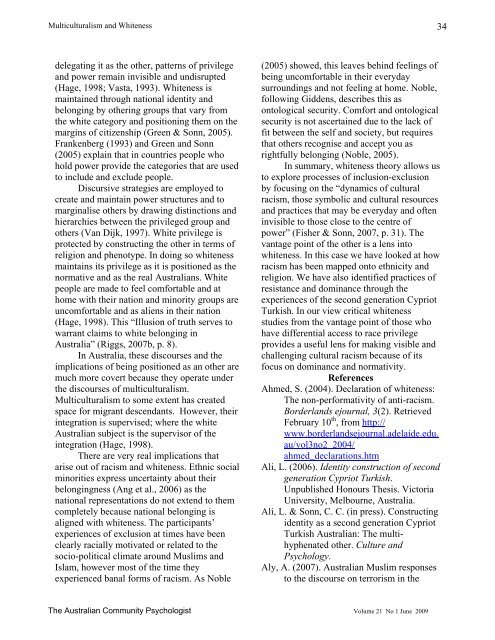issue 1 09 - APS Member Groups - Australian Psychological Society
issue 1 09 - APS Member Groups - Australian Psychological Society
issue 1 09 - APS Member Groups - Australian Psychological Society
Create successful ePaper yourself
Turn your PDF publications into a flip-book with our unique Google optimized e-Paper software.
Multiculturalism and Whiteness34delegating it as the other, patterns of privilegeand power remain invisible and undisrupted(Hage, 1998; Vasta, 1993). Whiteness ismaintained through national identity andbelonging by othering groups that vary fromthe white category and positioning them on themargins of citizenship (Green & Sonn, 2005).Frankenberg (1993) and Green and Sonn(2005) explain that in countries people whohold power provide the categories that are usedto include and exclude people.Discursive strategies are employed tocreate and maintain power structures and tomarginalise others by drawing distinctions andhierarchies between the privileged group andothers (Van Dijk, 1997). White privilege isprotected by constructing the other in terms ofreligion and phenotype. In doing so whitenessmaintains its privilege as it is positioned as thenormative and as the real <strong>Australian</strong>s. Whitepeople are made to feel comfortable and athome with their nation and minority groups areuncomfortable and as aliens in their nation(Hage, 1998). This “Illusion of truth serves towarrant claims to white belonging inAustralia” (Riggs, 2007b, p. 8).In Australia, these discourses and theimplications of being positioned as an other aremuch more covert because they operate underthe discourses of multiculturalism.Multiculturalism to some extent has createdspace for migrant descendants. However, theirintegration is supervised; where the white<strong>Australian</strong> subject is the supervisor of theintegration (Hage, 1998).There are very real implications thatarise out of racism and whiteness. Ethnic socialminorities express uncertainty about theirbelongingness (Ang et al., 2006) as thenational representations do not extend to themcompletely because national belonging isaligned with whiteness. The participants’experiences of exclusion at times have beenclearly racially motivated or related to thesocio-political climate around Muslims andIslam, however most of the time theyexperienced banal forms of racism. As Noble(2005) showed, this leaves behind feelings ofbeing uncomfortable in their everydaysurroundings and not feeling at home. Noble,following Giddens, describes this asontological security. Comfort and ontologicalsecurity is not ascertained due to the lack offit between the self and society, but requiresthat others recognise and accept you asrightfully belonging (Noble, 2005).In summary, whiteness theory allows usto explore processes of inclusion-exclusionby focusing on the “dynamics of culturalracism, those symbolic and cultural resourcesand practices that may be everyday and ofteninvisible to those close to the centre ofpower” (Fisher & Sonn, 2007, p. 31). Thevantage point of the other is a lens intowhiteness. In this case we have looked at howracism has been mapped onto ethnicity andreligion. We have also identified practices ofresistance and dominance through theexperiences of the second generation CypriotTurkish. In our view critical whitenessstudies from the vantage point of those whohave differential access to race privilegeprovides a useful lens for making visible andchallenging cultural racism because of itsfocus on dominance and normativity.ReferencesAhmed, S. (2004). Declaration of whiteness:The non-performativity of anti-racism.Borderlands ejournal, 3(2). RetrievedFebruary 10 th , from http://www.borderlandsejournal.adelaide.edu.au/vol3no2_2004/ahmed_declarations.htmAli, L. (2006). Identity construction of secondgeneration Cypriot Turkish.Unpublished Honours Thesis. VictoriaUniversity, Melbourne, Australia.Ali, L. & Sonn, C. C. (in press). Constructingidentity as a second generation CypriotTurkish <strong>Australian</strong>: The multihyphenatedother. Culture andPsychology.Aly, A. (2007). <strong>Australian</strong> Muslim responsesto the discourse on terrorism in theThe <strong>Australian</strong> Community Psychologist Volume 21 No 1 June 20<strong>09</strong>
















